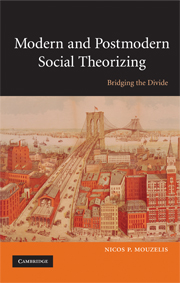Book contents
- Frontmatter
- Contents
- List of figures
- Acknowledgements
- Introduction
- Part I The theoretical background: the development of the agency–structure problematic
- Part II Parsonian and post-Parsonian developments
- Part III Agency and structure: reworking some basic conceptual tools
- Part IV Bridges between modern and late/postmodern theorizing
- Part V Towards a non-essentialist holism
- 13 Grand narratives: contextless and context-sensitive theories
- 14 The actor–structure dimension: anti-conflationist holism
- 15 The micro–macro dimension: anti-essentialist holism
- 16 The inter-institutional dimension: beyond economism and culturalism
- Instead of Conclusion: Twelve rules for the construction of an open-ended holistic paradigm
- Appendix: In defence of ‘grand’ historical sociology
- References
- Index
15 - The micro–macro dimension: anti-essentialist holism
Published online by Cambridge University Press: 05 June 2012
- Frontmatter
- Contents
- List of figures
- Acknowledgements
- Introduction
- Part I The theoretical background: the development of the agency–structure problematic
- Part II Parsonian and post-Parsonian developments
- Part III Agency and structure: reworking some basic conceptual tools
- Part IV Bridges between modern and late/postmodern theorizing
- Part V Towards a non-essentialist holism
- 13 Grand narratives: contextless and context-sensitive theories
- 14 The actor–structure dimension: anti-conflationist holism
- 15 The micro–macro dimension: anti-essentialist holism
- 16 The inter-institutional dimension: beyond economism and culturalism
- Instead of Conclusion: Twelve rules for the construction of an open-ended holistic paradigm
- Appendix: In defence of ‘grand’ historical sociology
- References
- Index
Summary
Introduction
An adequate holistic framework should provide conceptual tools for overcoming the compartmentalization that prevails today between micro- and macro-sociologies – the former rejecting all macro-theories as elaborate reifications, the latter dismissing micro approaches as myopic, reductive or empiricist. As already mentioned, a holistic framework should not aim at abolishing the division of labour within the social sciences between micro and macro empirical studies; it should rather transform the present ‘walls’ into ‘bridges’. This means that macro-theoretical statements, for instance, should be constructed in such a way that it is possible to provide ‘micro-foundations’ – even if the theory itself does not do so. Therefore, when studying problems that become visible only when one focuses on such macro-entities as social classes or nation-states, it should be possible to move from macro- to meso- and micro-levels of analysis. For example, in the examination of the overall power structure of a multinational organization, a holistic framework should enable the researcher to establish bridges ‘downwards’, showing how social games taking place at the top of the organizational hierarchy link up with games taking place in the national, regional or local contexts. The focus of the research effort can, of course, be on a single level of analysis, but it must always allow another researcher to use the relevant research findings while moving ‘upwards’ or ‘downwards’ in a theoretically consistent manner.
- Type
- Chapter
- Information
- Modern and Postmodern Social TheorizingBridging the Divide, pp. 237 - 260Publisher: Cambridge University PressPrint publication year: 2008



